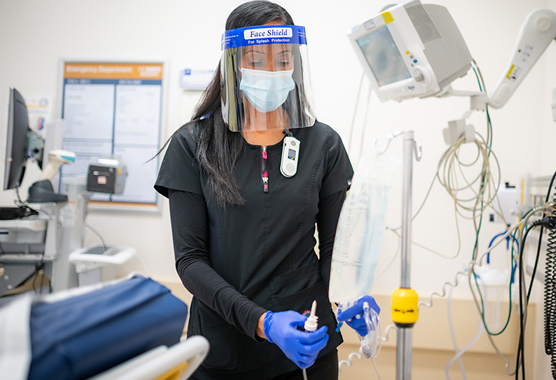Bird Flu (Avian Influenza)
At UC Davis Health, we offer compassionate care for people who have or are at risk for bird flu. We provide diagnosis, treatment and support options customized just for you.
Medically reviewed by Dean Blumberg, M.D. on Nov. 08, 2023.

What Is Bird Flu?
Avian influenza (bird flu) is a type of influenza virus that usually affects wild birds, such as ducks, geese, storks and swans. Bird flu also passes easily to domestic birds, such as chickens and turkeys.
Bird flu doesn’t usually affect humans, but there have been some cases where people have become infected. These cases have mainly been in the Middle East and Southeast Asia.
At UC Davis Division of Infectious Diseases, our providers are experts in preventing, diagnosing and treating all types of infectious disease, including bird flu. We use the latest research and studies to help ensure that we’re providing the highest level of patient care.
Symptoms of Bird Flu
Many symptoms of bird flu are similar to those of a typical flu. Some people may not have any symptoms.
Common Symptoms of Bird Flu
These symptoms could be signs of avian influenza:
- Cough, sore throat and a runny or stuffy nose
- Fatigue
- Fever
- Muscle and body aches
- Nausea, vomiting or diarrhea
- Pink eye (conjunctivitis)
- Shortness of breath
More Severe Symptoms of Bird Flu
More serious avian influenza symptoms may include:
- Acute respiratory distress syndrome (ARDS)
- Mental changes
- Multi-organ failure
- Pneumonia
- Respiratory failure
- Seizures
- Septic shock
Causes of Bird Flu
Bird flu passes to humans when they come into contact with the virus. Infected birds shed the virus through their feces, mucus and saliva. Contact with the virus may occur if you:
Breathe in the Virus
You may inhale the bird flu virus through dust or droplets in the air.
Touch an Infected Bird
Touching a bird with avian flu can spread the virus.
Touch an Infected Surface
Bird flu can spread when you touch a surface that has the virus on it, such as a cage or farm equipment, and then touch your eyes, mouth or nose.
Have Close Contact With an Infected Person
In extremely rare cases, a person who has the bird flu could potentially infect other people.
Bird Flu Risk Factors
The chances of getting avian influenza are higher if you also have one or more of these risk factors:
Biological Sex
Men appear to be at higher risk of bird flu than women.
Working in the Poultry Industry
Poultry farmers and processors are at a greater risk of bird flu.
Diagnosing Bird Flu
To diagnose bird flu, we will first ask you about your symptoms and do a physical examination. We will also ask if you work with birds or have recently been near birds.
If we suspect bird flu, we will swab your nose or throat to test for the virus. This test is most accurate if done within a few days of when the illness starts. If you are already very sick, we may do a sputum culture to test your phlegm (sputum) for the bird flu virus.
Bird Flu Treatments at UC Davis Health
At UC Davis Health, our providers specialize in treating infectious diseases such as avian influenza. If you have bird flu, we will treat you in a private hospital room (isolation room) to prevent the spread of the virus. Bird flu treatments that we offer include:
Antiviral Medications
Medications that help your body fight viruses may reduce the severity of the bird flu. They can also lower your risk of complications.
Fever-Reducing Medications (Antipyretic Therapy).
Medications such as nonsteroidal anti-inflammatory drugs (NSAIDs) can help to reduce fever.
Fluid Replacement (Fluid Resuscitation)
An intravenous (IV) drip or salt and sugar solutions (oral rehydration therapy) can help replenish your body’s fluids.
Supplemental Oxygen Therapy
Oxygen given as a gas or liquid can help you breathe better.
Dialysis
This machine helps remove waste products from your blood if your kidneys stop working well.
Ventilator
A machine can help you breathe if you have problems breathing on your own.
Preventing Bird Flu
There are certain steps you can take to reduce your risk of bird flu. Make sure to:
Avoid Direct Contact With Wild Birds
Staying a reasonable distance from any birds can reduce your risk of getting bird flu.
Be Aware of Your Hands
Be careful not to touch your eyes, mouth or nose if you come into contact with birds or surfaces that may contain their feces, mucus or saliva.
Reduce Exposure
Limit or avoid visits to poultry markets and farms when traveling.
Stay Away From Sick Birds
Try to avoid birds that seem ill or have died.
Wash Your Hands
Clean your hands thoroughly after you come into contact with a bird.
Wear Protective Equipment
Use an eye protector, facemask and gloves if you work with poultry.
Median time from infection to detection
6.5Days during the 1997 bird flu outbreak
Source: National Library of Medicine: Avian Influenza
Request an Appointment
As Sacramento's No. 1 hospital, you'll benefit from unique advantages in primary care and specialty care. This includes prevention, diagnosis and treatment options from experts in 150 specialties.
Referring Physicians
To refer a patient, submit an electronic referral form or call.
800-4-UCDAVIS
Patients
Call to make an appointment.
Consumer Resource Center
800-2-UCDAVIS

Ranked among the nation’s best hospitals
A U.S. News & World Report best hospital in cardiology, heart & vascular surgery, diabetes & endocrinology, ENT, geriatrics, neurology & neurosurgery, and pulmonology & lung surgery.

Ranked among the nation’s best children’s hospitals
U.S. News & World Report ranked UC Davis Children’s Hospital among the best in pediatric nephrology, orthopedics*, and pulmonology & lung surgery. (*Together with Shriners Children’s Northern California)

Ranked Sacramento’s #1 hospital
Ranked Sacramento’s #1 hospital by U.S. News, and high-performing in aortic valve surgery, back surgery (spinal fusion), COPD, colon cancer surgery, diabetes, gynecological cancer surgery, heart arrhythmia, heart failure, kidney failure, leukemia, lymphoma & myeloma, lung cancer surgery, pacemaker implantation, pneumonia, prostate cancer surgery, stroke, TAVR, cancer, orthopedics, gastroenterology & GI surgery, and urology.

The nation’s highest nursing honor
UC Davis Medical Center has received Magnet® recognition, the nation’s highest honor for nursing excellence.

World-class cancer care
One of ~59 U.S. cancer centers designated “comprehensive” by the National Cancer Institute.

A leader in health care equality
For the 13th consecutive year, UC Davis Medical Center has been recognized as an LGBTQ+ Healthcare Equality Leader by the educational arm of America’s largest civil rights organization.

